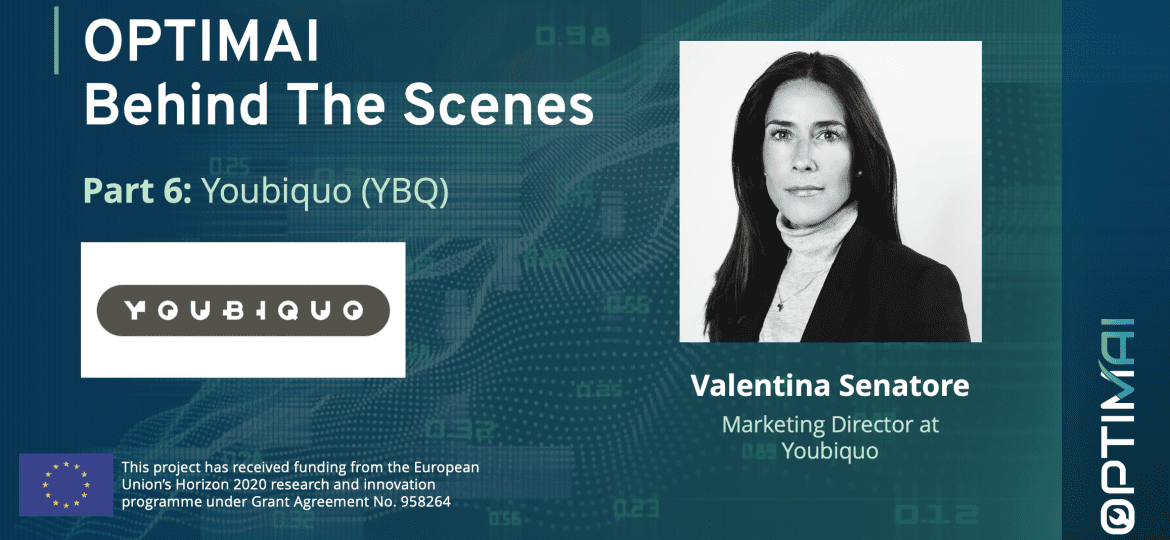
This week, we interview Valentina Senatore, Marketing Director of project partner Youbiquo (YBQ). In her answers, Valentina tells us about the extent of YBQ’s expertise in the Smart Glasses industry and how their participation is key for the OPTIMAI project to achieve its goals.
Hi Valentina, thanks for speaking to us today. Could you start by introducing yourself and telling us where you are based?
Hello, my name is Valentina Senatore and I am the Marketing Director at Youbiquo, short name YBQ. YBQ is an innovative SME whose mission is the design and manufacturing of Augmented Reality (AR) smart wearables. The company was founded in 2014 in Cava De’ Tirreni, which is located in the south of Italy. It established a branch in the UK in May 2021, which is dedicated to an AR standardization committee project.
What does your typical working day in the OPTIMAI project involve?
Over the last 8 months, my typical working day has involved talks and meetings with the various partners of the consortium as well as the translation of user specifications to technical requirements.
What is your main task in the OPTIMAI project?
YBQ will bring its experience in the development of customized Augmented Reality Smart Glasses and in computer vision algorithms to allow manufacturing companies to have better performances along assembly lines or during maintenance activities, thanks to hand gesture interaction and object recognition.
We lead the task dedicated to the definition of wearable devices for real-time assistance on the production line. YBQ will define and gather together the OPTIMAI hardware and IoT infrastructure (e.g. industrial sensors, machine sensors, industrial cameras, μ-profilometry surface scanning instruments, etc.), to accommodate the evolving interaction and visualization mechanisms that will be devised in the context of this work package. Central to this approach are the binocular AR smart glasses, which will be built upon a customized product and based on the “Talens Holo” smart glasses made by YBQ.
What do you like most about your role?
YBQ was founded as an innovative start-up and, thanks to challenging projects developed in the last five years, today we are still striving for excellence in knowledge and innovation. OPTIMAI is challenging our R&D department and is supporting our vision. This is what engages and stimulates us most.
Has working remotely affected your work on OPTIMAI in any way?
Working remotely has always been part of our working structure thanks to the use of collaborative tools. Up to now, the departments involved didn’t necessarily need to work from the office. However, meeting the other consortium partners in person is something we are really looking forward to.
How do your professional interests match the objectives of OPTIMAI?
YBQ is focused on different hardware and software solutions dedicated to the Industry 4.0 segment. Our significant experience in augmented reality use-cases for enterprises is contributing to the OPTIMAI project’s objectives that match with YBQ’s main goals.
What is unique about OPTIMAI in your opinion?
The KPIs of the project, if accomplished, will enable the early detection of defects thanks to effective display alerts in Augmented Reality Smart Glasses. Further, we’ll try to improve the identification of potentially defective parts and the prediction of defects and malfunctions that, with the existing technology, are less efficient without the use of AR.
What makes your organisation ideal for participating in the research/activities of OPTIMAI?
YBQ is one of the only two European product companies involved in the design and manufacturing of AR smart glasses for the B2B market in the Industry 4.0 domain. We have expertise in several R&D projects and we are experts in prototyping customized AR wearables equipped with sensors that are use-case oriented.
Has anything surprised you in the first 8 months of the project?
We were surprised by the boost in the interest of the Industry market in adopting AR technology, which may be a reaction to the pandemic; industries have accelerated their digital transformation to become more productive and resilient to external changes.
What do you see as the biggest challenge for OPTIMAI?
OPTIMAI aims to introduce a more competitive solution for enterprises to the market, enhancing the use-cases and the performances compared to general-purpose competitors’ devices. The biggest challenge is related to one of the project’s main goals; zero defects on the production lines nowadays is a dream.
What is one key thing you have learned from working on OPTIMAI so far?
Exploring the gaps highlighted by established companies such as KLEEMANN, Televes and Microchip Technology is providing crucial information that is guiding us and the other consortium partners in the definition of the project architecture and end-user features in line with a successful commercial solution.
Could you describe the overall expected impact of the OPTIMAI project in three words?
Optimized Innovative Manufacturing.
What would be your advice to anyone interested in getting involved with a Horizon Europe project?
The Horizon Europe ecosystem is made up of research centres and companies with niche expertise that, when shared, can lead to disruptive, visionary innovation.
It is hard and challenging, especially for small-medium enterprises, but the projects are structured to be partner-friendly thanks to the coordination of experienced organizations. A project management mindset and an agile methodology approach are needed.
Thank you for taking the time to speak to us, Valentina! We look forward to more updates from the team at YBQ.
To keep up to date with the Behind the Scenes series and all OPTIMAI updates, make sure to follow us on Twitter, LinkedIn and YouTube.

